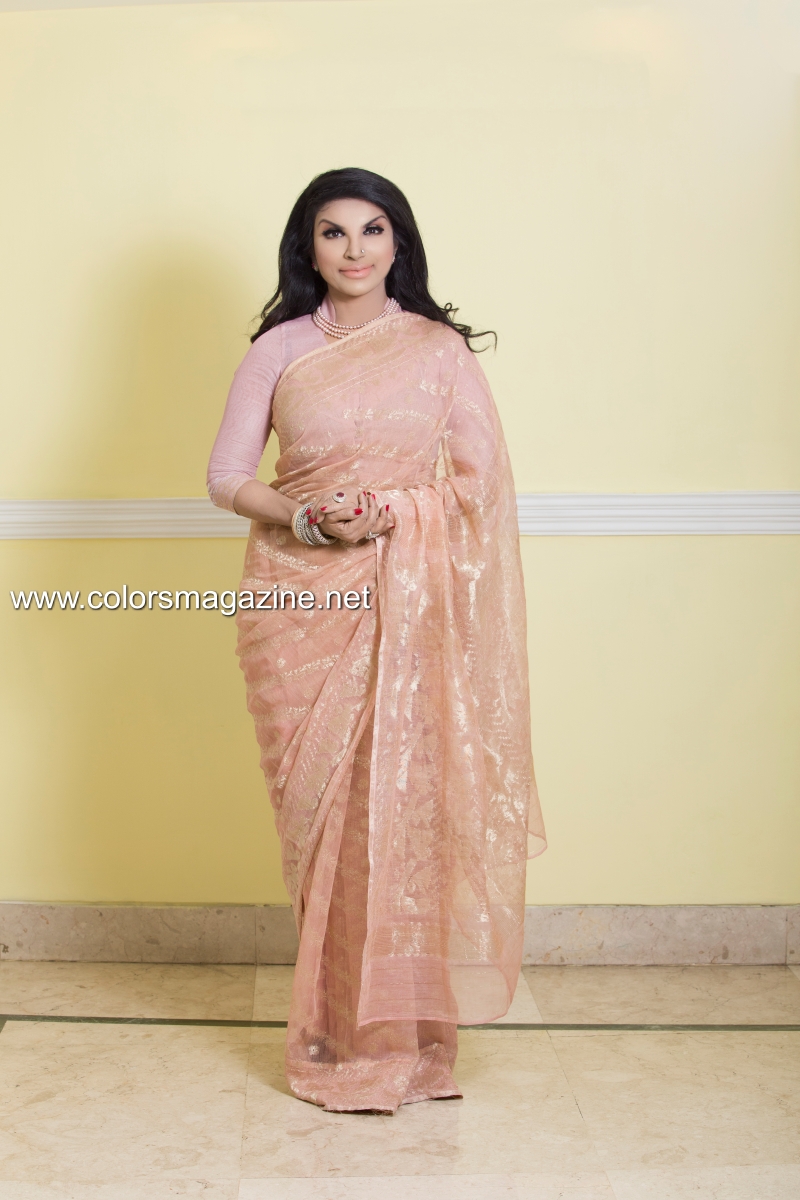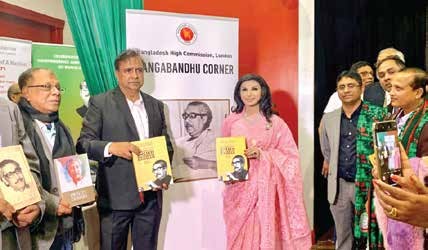Diplomacy with Flair

It was her quick presence of mind and
We interviewed Saida Muna Tasneem in the last week of April when she was visiting Dhaka to attend the third “strategic dialogue” between Bangladesh and the UK. She was generous enough to squeeze a slot for us in her chock-a-block schedule one morning. We met in her Baridhara apartment then. Her sartorial elegance was unmistakable as she greeted us with her characteristic heart-warming smile donned in a light pink jamdani sari. Affable, she made us feel at ease in no time. She lightened up the atmosphere so that the interview ended up being almost like a friendly chat.
We began, however, by focusing on the need for
It was in London, at Pembridge Garden to be precise, in a place currently called the Bangladesh Centre, that the Bangladesh flag was raised—at a time much before the final hours of victory in our war of liberation in 1971. The UK had understood the values that the Bengalis were fighting for quite early. It was also the first country chosen by Father of the Nation Bangabandhu en route to his homecoming in January 1972. It was in the UK that he had hosted the first international press conference of independent Bangladesh. The British people, inspired by our Bengali expatriates there, had recognized Bangladesh’s aspirations to emerge as a secular republic and opt out of a nation that had touted itself as an Islamic republic.
The year 2020 will mark the birth centenary of the Father of the Nation, Bangabandhu Sheikh Mujibur Rahman, while 2021 will mark 50 years of Bangladesh’s diplomatic relations with the UK, and of course the golden jubilee of our independence. All three events are in one way or the other connected to Britain, suggesting priorities to keep in view for leaders of both countries. Also, given Bangladesh’s phenomenal economic growth in the past decade, there is a lot to look forward to in taking the narrative of this relationship further forward. In the past three and a half decades, our esteemed diplomat explained to us, development aid was the first priority and not building on shared values. Now the relationship is maturing into the one where Britain sees Bangladesh as a trade and investment hub, a country with great potential, a market of 165 million people, and the world’s 41st largest economy currently growing at 8.13 percent; indeed, it is among the top three

Till now, the High Commissioner pointed out, the British had been among the leading voices in European Union dealings in Dhaka, but if and when Brexit happens, Bangladesh will have to deal with a non-EU and an exclusively global-minded Britain. She observes, “The UK is going to reassert its diplomatic identity as a nation. It’ll open 100s of diplomatic missions and recalibrate its political and economic relationships with many
She feels that as High Commissioner to the UK, her top priority will be to increase exports to the UK and attract more investments and remittances from the UK. She wants to profile Bangladesh in the UK as a truly valuable partner. “I also want to see our Bangladeshi-British community thriving and being given due importance by the British government. Moreover, I look forward to high profile events involving the Bangladeshi diaspora, along with showcasing our cricketing ties for more connectivity.”
The High Commissioner sees post-Brexit Britain utilizing Bangladesh as a manufacturing and re-export hub, taking advantage of its 100 economic zones, and making optimum use of its young workforce, especially its women. One noteworthy area that is worth focusing on, she notes, is Fintech and IT, while others are, infrastructure and defense. As she point out, “Bangladesh is producing 50,000 graduates in technology and computer science each year. I think the British ought to take a fresh look at Bangladesh for manufacturing and outsourcing IT goods and services, including software and artificial intelligence. We also have a local consumer base of 165 million people and access to India’s seven states, so it is a great country to invest in manufacturing, and to sell British goods and services. Bangladesh’s import from the UK, currently estimated at $300 million, can be increased easily. Bangladesh, too, could benefit by enhancing its UK exports, upping it considerably from the current figure of $4.4 billion.”
Astute diplomat that she is, High Commissioner Saida Muna Tasneem regretted that there is a misperception in some British business circles that Bangladesh is still producing garment items in ‘sweatshops’. She stresses that such a perception needs a serious reality check. She declares, “Global auditors have found that seven of the only 12 green readymade garment factories in the entire world are now located in Bangladesh. That is how enterprising and compliant we are. We are also working with the Sustainability Compact people for making our garment factories even safer. I personally feel that currently we suffer from an image crisis, mostly in the UK media, rather than in the EU or the US.We need to build a positive image for our RMG industry.” At the end of this year the High Commission will be organizing an Investment Conference to dispel such misconceptions.
Bangladesh is in the process of graduating from “least developed country status” and by 2027 the country will, in all probability, be no longer in the LDC group. “So, we are looking at new trading arrangements with Britain, post-LDC,” says the High Commissioner adding that, “We as a nation want Britain to continue to give us the duty-free, quota-free access that we are entitled to now in the EU market. At the previous strategic dialogue, Dhaka insisted on continuation of the ‘everything but arms’ GSP facility for Bangladesh goods and services in the UK, since Bangladesh now needs not aid, but trade facilitation. In fact, UK aid to Bangladesh is currently focused mostly on the Rohingyas, civil society and the private sector; no more aid is directed exclusively to the Bangladesh government.” The envoy also observes, “ Since Bangladesh has inherited the British education system, and has 65 per cent of its population between ages of 18-35, we want to see more of our young people getting undergraduate and higher education opportunities in the UK and have their skills utilized by Britain afterwards.”

In the Bangabandhu Centenary year in 2020, Bangladesh will be joined by Britain in organizing many of the commemorative programs in London, while, in its 50th anniversary, Dhaka looks forward to a royal visit, a joint commemorative event and a friendship cricket match between Bangladesh and England. The spirited diplomat says, “We should use this common ground to take our relationship to the next level, strengthening the kind of cultural connectivity which is now missing.”
Dwelling on the way the relationship can develop in the future, the diplomat emphasizes strengthening strategic and security linkages between Bangladesh and Britain as the next priority for both countries. Bangladesh’s geo-strategic location between South Asia and Southeast Asia with the Bay of Bengal as a third neighbor provides British companies great advantage of manufacturing in Bangladesh and re-exporting to India and to the ASEAN countries. She declares that the UK should take a close look at the stock exchanges in Bangladesh, along with its financial services sector, stressing areas such as insurance as well as, Fintech, IT and renewable energy. Bangladeshi exporters, for their part, should be looking closely at Britain’s domestic market for pharmaceuticals, tea, leather products, bicycles and diversified jute products.
A diplomat who had previously served as Ambassador to Thailand and Cambodia, Saida Muna Tasneem describes her four years in this capacity as “very vibrant, memorable, enjoyable and busy” ones. She says she has been able to shape the Bangladesh-Thailand relationship canvas in the way she wanted to. She observes, “I am extremely pleased to have moved from one kingdom to another – from the Kingdom of Thailand and
Fleshing out the details about the kind of work she did previously, Saida Muna Tasneem emphasizes, “I am a very trade-investment focused diplomat. I did my market surveys, tried to bring in investment from Thailand; and, pleasingly, everything worked out to my satisfaction. Our exports to the zone went up by 10-13
“Right now it’s time for Myanmar to fix the problem. It’s time to set the record straight, correct their mistakes and take their Rohingya nationals back.”
Being in the UK from an Asian country, the diplomat believes that “Overall all of us in Asia are eager to learn and learn faster to provide services… The West, on the other hand, really needs to keep up with us.” The greatest strength of Asian nations like Bangladesh, she feels, is the young population, who are eager to think like international citizens in an age of digital connectivity. She observed that the global young generations in Bangladesh are breaking the barriers of service industries and doing very well in technology sectors.
The High Commissioner declares that young people in Bangladesh need to continue to reaffirm all the character traits of a secular and progressive nation; uphold traits that Bangabandhu taught us and that we have been upholding so far under his daughter, Prime Minister Sheikh Hasina’s visionary leadership. Our culture and Bengali nationalism is our biggest brand and that is exactly how I am profiling Bangladesh to raise its progressive image in the UK.”
Saida Muna Tasneem had headed the Foreign Office UN Wing as a
To underscore her motivation mantra as a Bangladeshi, the diplomat says, “We as a nation do so much with so little. We are extremely resilient and hard-working, and we should not be undervalued. We shouldn’t settle for anything second grade. As Bangladeshis we should always prioritize self-respect.”
This career diplomat did her MSc in Public Policy and Management from the School of Oriental and African Studies, University of London. She had earlier obtained her BSc (Engineering) degree from the Bangladesh University of Engineering and Technology (BUET), Dhaka, in 1988. She had also worked as an engineer for three years. However, what led her to
The diplomat gained a great deal of popularity at a recent interview
Saida Muna Tasneem says, “The world will do everything but stop short of taking one Rohingya into their territory. Bangladesh is the only country and Prime Minister Sheikh Hasina the only world leader, who voluntarily gave part of its sovereign space to the Rohingyas. We did it voluntarily because these minorities were subject to genocide. They were subject to atrocities and gender-based violence. Nobody forced us to help them. As our Prime Minister had asserted, ‘Bengalis as a nation were victims of similar crimes in 1971 and we understand the injustice’.”
She suggests that, “Right now it’s time for Myanmar to fix the problem. It’s time to set the record straight, correct their mistakes and take their Rohingya nationals back.” She observes, “There shouldn’t be any expectations of Bangladesh hosting them forever, as that would be condoning the inhumane crimes committed and supporting impunity”.
For young women of the country she says, “the future of a woman should not be any different than that for a male. The formula is simple: First of all, get education, act together, strive hard to achieve excellence academically and then move on to professional lives, exhibiting the same diligence and perseverance you showed earlier, if not more. Education empowers all.”
Our enterprising diplomat in a concluding note declares, “It is my firm belief that a woman does not have to get in anywhere through quotas; she can do so through merit. In the long run, I don’t believe in quotas for women. It should be merit and merit only that should direct us. Women need to have a good set of professional friends and network, as their own support groups. Also, all empowered women have a special responsibility to always help other aspiring women.”




